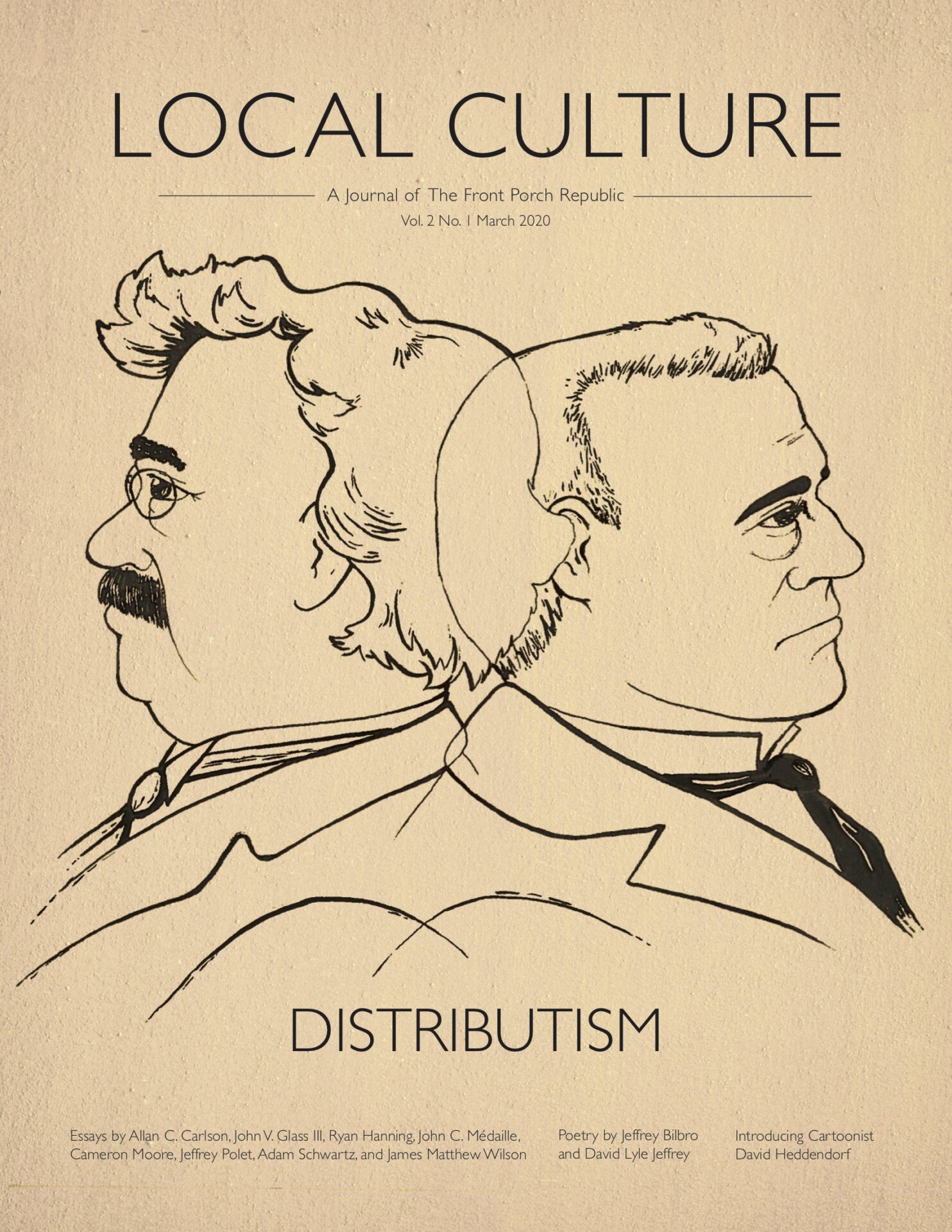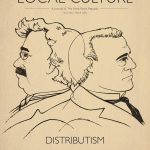A new issue of Local Culture: A Journal of the Front Porch Republic is heading to the printer. Below, you can read the editor’s prefatory letter. If this whets your appetite, you can view the table of contents and subscribe to the journal. To receive a copy of this issue on the distributists, you’ll need to subscribe by March 1.
A curiosity of the 20th-century English-speaking world is that it produced, almost coevally, two very similar kinds of rebels that an ocean effectively kept separate: the Distributists in Britain and the Southern Agrarians in America. Among the former were G.K. Chesterton, Hilaire Belloc, Fr. Vincent McNabb, and Eric Gill, among the latter John Crowe Ransom, Allen Tate, Donald Davidson, and Andrew Lytle.
Isolated as these rebels were from each other, at least initially, their resemblances were nevertheless unmistakable: a preference for small-scale land-based economies, a firm conviction that the ownership of productive property should be widely dispersed among the citizenry, a distrust of centralization, whether of power or ownership or both, and therefore a resistance to the centripetal tendencies on offer from Capitalists and Socialists (or Collectivists) alike. Those resemblances were effects that followed on similar causes, one of them a shared precipitant: the great eruption we call the Industrial Revolution, which in due time would hospitably nurture the competing ideologies that so bedeviled the 20th century and that vex us still. Another cause is a fact of human existence that both movements bore witness to: namely, that wherever the natural order endures such monstrous shocks as a factory rising up out of a dingle and polluting the river that runs through it, or the decay of rural places and the dispossession of their once-free people, or the willed destruction of longstanding associations and ways of living, or the eviction of craftsmen from their work by machines that impoverish the poor to enrich the wealthy, or the displacement of good artisanal objects by artless “goods” mass-produced badly, or indeed a willingness to suffer the word “goods” to be used—without irony— as an unproblematic and unimpeachable substitute for “necessities” until whatever distinction between them has dissolved into no difference whatsoever, right on down to that summum bonum known as the iPhone 11 with slow-motion video capability (for who can live without that staple of life?)—when, I say, the natural order endures such monstrous shocks as these, men and women of good sense, few though they be, will object to them.
The Southern Agrarians were the second of these rebel groups to arrive on the scene. They marked their advent with the publication in 1930 of I’ll Take My Stand, which was a defense of the agrarian ways of the vital South over and against the encroaching but lifeless industrialism of the North. But by 1930 the leading figures of Distributism had been at work for a while. Hilaire Belloc’s The Servile State appeared in 1912, G.K. Chesterton’s What’s Wrong With the World and The Outline of Sanity in 1910 and 1926, respectively. In 1920 Eric Gill co-founded the Guild of St. Joseph and St. Dominic, a community of craftsmen at Ditchling Common in the Sussex countryside, where Gill—talented, articulate, and reprobate—had been living since 1907. The community included, for a time, Fr. Vincent McNabb, whose The Church and the Land appeared in 1926. The guild itself, according to Hugh Walters (writing in New Blackfriars), was “based on the Tertiary life and self- sufficient principles, or, as Gill saw it, normal life before industrialism,” when workmen owned their own shops and tools and when the artist in a man had not yet filed for separate maintenance from the worker in him in a diabolical effort to put asunder what God had joined together. The Distributists would influence, among others, Dorothy Day and Peter Maurin of the Catholic Worker Movement, Barbara Ward, and E.F. Schumacher (who would perform the useful office of resuscitating and strengthening their theories). And yet in 1930 the Agrarians seemed wholly unaware of their British allies.
That changed with Herbert Agar, who would prove to be the hinge figure. A columnist and London correspondent for the Louisville Courier-Journal, Agar was amicably disposed to the governing ideas of both groups. His book The People’s Choice: From Washington to Harding: A Study in Democracy lamented America’s lapse into plutocracy from a republic of landowners. (It also won him a Pulitzer Prize in 1934.) While living in London he worked on Chesterton’s G.K. Weekly and became acquainted with Distributist thought. Allen Tate, one of the two main figureheads of the Southern Agrarians, had reviewed The People’s Choice favorably and, while trying to put together a sequel to I’ll Take My Stand, wrote to Agar to draw him into the project, which was faltering for want of a unified vision, not to mention a publisher. Agar would become the book’s co-editor, and it was his publisher that would bring it out in 1936 under the title Who Owns America? It included both Agrarian and Distributist contributors. Belloc’s own essay, “The Modern Man,” anchored the symposium. The rebels against ugliness, dispossession, and servitude to industrialism—the beast of almost miraculous cunning but no intelligence, as John Crowe Ransom called it—had not only met but collaborated.
* * *
Chesterton regarded Belloc as the principal spokesman for Distributism, as indeed he was. In The Servile State Belloc claimed that as Capitalism perfected itself it became less stable, in part because of a conflict between its governing logic and the moral base of English law and tradition. Whereas the law still “defends property as a normal institution,” and whereas it still “punishes theft as an abnormal incident” owing to evil motives, this standard hardly accords with the “social reality of a Capitalist State,” which rewards a “hundred forms of fraud” as
the necessary corollary of unrestrained competition between a few and of unrestrained avarice as the motive controlling production. . . . The vast bulk of so-called “free” contracts are to- day leonine contracts: arrangements which one man was free to take or to leave, but which the other man was not free to take or leave, because the second had for his alternative starvation.
The real sanction for social misconduct, Belloc said, is not imprisonment but unemployment: “Most men now fear the loss of employment more than they fear legal punishment. . . . The true master of the Englishman to- day is not the Sovereign nor the officers of State, nor, save indirectly, the laws; his true master is the Capitalist.” This happens to men who, bereft of the meat of ownership, are nevertheless allowed a small bone of freedom to remind them of its taste: “After the long terrors imposed upon them through a freedom unaccompanied by property, they see, at the expense of losing a mere legal freedom, the very real prospect of having enough and not losing it.”
Not Collectivism but Distributism (or the Proprietary State, as Belloc also called it) is the one suitable alternative to this precarious and undignified state of affairs. But Distributism is also the more difficult to achieve, and Belloc was at some pains to show why. The “stage of the disease” that England was in admitted of the Collectivist’s “remedy with less shock than it admits of a reaction towards well-divided property.” For, plainly, it is far easier to purchase a large chunk of private ownership with public money (think of a railway or a harbor company, he says), and then to hand the whole operation over to publicly-funded administrators, than it is to spread ownership out among several small shareholders. For, gnawing on the bone of freedom until there is nothing left of it, men, having forgotten its savor, might not want the responsibilities of freedom or the duties of ownership. Moreover, “the man who desires to re-establish property as an institution normal to most citizens in the State is working against the grain of our existing Capitalist society, while the man who desires to establish Socialism—that is Collectivism—is working with the grain of that society.”
In fine, State takeover “is a thing with which we are familiar and which seemingly might be indefinitely multiplied.” The Collectivist experiment conduces to the Capitalist society it is bent on replacing because of how well “it works with the existing machinery of Capitalism.” It “talks and thinks in the existing terms of Capitalism, appeals to just those appetites which Capitalism has aroused, and ridicules as fantastic and unheard-of just those things in society the memory of which Capitalism has killed among men wherever the blight of it has spread.”
But it is all the more necessary to choose the difficult way of the Distributist State, for the Collectivists are not, as they believe, moving toward their desired ends but toward a third and very different thing: a “society in which the Capitalist class shall be even more powerful and far more secure than it is at present.” In that society the unpropertied masses would “not suffer from particular regulations” but would “change their status, lose their present legal freedom, and be subject to compulsory labour”; that is, they would “labour among an unfree majority of non-owners for the benefit of a free minority of owners.” And that is a Servile State.
* * *
A little ink should probably be spent on what “Capitalism has killed among men,” as Belloc put it, because although the basic principle of widely distributed property may be known and competently grasped—it is a tune that in America had been played in a Jeffersonian key, after all—it is perhaps less firmly grasped that, on Belloc’s account, what capitalism had killed in both fact and memory was a Distributist society that had thrown off the servility now being re-imposed on it.
Belloc argued—in what some might regard as a revisionist mode—that the centuries-long growth of Christendom in Europe slowly resulted in a concomitant diminishment of the slavery European culture grew out of and eventually outgrew, such that by the end of the 10th century the sale and purchase of men was almost unknown. From the slave the serf emerged, and from the serf the peasant, and by the end of the 14th century the peasant’s land for most practical purposes was his. With the rise of towns and guilds servility was forgotten. Cooperative bodies assured the stability of a distributive system that guaranteed “the small proprietor against loss of his economic independence, while at the same time it guaranteed society against the growth of a proletariat.” Such, said Belloc, “was the transformation which had come over European society in the course of ten Christian centuries. Slavery had gone, and in its place had come that establishment of free possession which seemed so normal to men, and so consonant to a happy life.” The Middle Ages had “instinctively conceived and brought into existence the Distributive State.”
This State did not last, but it was not the Industrial Revolution that destroyed it. For Belloc the signal event that caused its destruction, an event that anticipated the late Enclosure Acts of the 18th and 19th centuries, was the seizure of monastic lands under a 16th-century king who, although adequately concupiscent, was neither rich nor powerful enough to retain those lands. Henry VIII failed to keep the Church’s lands because, notwithstanding the widespread distribution of productive property that obtained at his accession, a class of large landowners already controlled “anything from a quarter to a third of the agricultural values of England . . . [and] were too strong for the Monarchy.” “It is important to grasp clearly the nature of this operation,” Belloc said, “for the whole economic future of England was to flow from it.” After the seizure of monastic lands the wealthy in England,
who already held in virtually absolute property from one-quarter to one-third of the soil and the ploughs and the barns of a village, became possessed in a very few years of a further great section of the means of production, which turned the scale wholly in their favor. They added to that third a new and extra fifth. They became at a blow the owners of half the land!”
Chesterton concurred but, as usual, made the point more vividly: the Englishman “woke up one fine morning and discovered that the public things, which for eight hundred years he had used at once as inns and sanctuaries, had all been suddenly and savagely abolished, to increase the private wealth of about six or seven men.” From this circumstance emerged the great country houses of England. By the time of Mary I, Belloc said, “a mass of new families had arisen, wealthy out of all proportion to anything which the older England had known, and bound by a common interest to the older families which had joined in the grab.” These few outrageously wealthy families, few in number but eventually strong in Parliament, “rose upon the ruin of religion.” By 1700 more than half of the English who, in those ten Christian centuries had slowly come into possession of productive property, had been dispossessed of both land and capital. The movement of a centuries-long process away from servility had been reversed, and England would soon be a servile state once again.
It was this economic reality that the Industrial Revolution came spinning into, not as cause but as effect. “England, the seed-plot of the Industrial System, was already captured by a wealthy oligarchy before the series of great discoveries began.” The Luddites scarcely had time to express their grievances against the labor-saving devices that evicted them from their livelihoods when the most concentrated rate of enclosures in British history occurred. Kirkpatrick Sale reminds us in Rebels Against the Future that from 1770-1830
some 3,280 bills were passed by Parliament, by which more than 6 million acres of commonly held lands, open fields, meadows, wetlands, forests, and unoccupied “waste” lands, until then the domain of the public at large, were put into private hands and subsequently hedged and fenced and farmed and herded and hunted for private gain.
Chesterton called this an “easy aristocratic habit” that had been immortalized by “a fine old English rhyme”:
You prosecute the man or woman
Who steals the goose from off the common,
But leave the larger felon loose
Who steals the common from the goose.
“Here,” Chesterton continued, “as in the case of the monasteries, we confront the strange problem of submission. If they stole the common from the goose, one can only say that he was a great goose to stand it,” except of course “they reasoned with the goose” and told him, as they would ever after, that it was all done for his good, for the good of the future, and in obedience to the irresistible forces of historical necessity.
So in the nineteenth century the great nobles who became mine-owners and railway directors, earnestly assured everybody that they did not do this from preference, but owing to a newly discovered Economic Law. . . . For an aristocracy is always progressive; it is a form of going the pace. Their parties grow later and later at night; for they are trying to live tomorrow.
And so the prole was born again, but not to walk in newness of life. He was no longer able to obtain what he needed by his own craft and skill. Henceforth he would have to procure his necessities from a shop, where he was expected to exchange money he had no way to earn except in the factory system that reduced skilled men to specialized workers when it wasn’t exploiting their wives and children. It would abstract from whole men mere “hands,” just as, right on down the industrial line, it would abstract horsepower from the horse, the whole grass-eating animal, as Allen Tate in time would point out. Not all at once, writes Sale,
not everywhere with the same intensity, but in the course of no more than a few generations England saw the effective end of a world based on an enclosed communitarian life, a high degree of non-market self-sufficiency, a simple system of local exchange and barter, a heritage of multiple crafts, and interwoven customs and traditions of mutuality lying outside the chaffer of the marketplace.
And in the textile industry, to cite but one example, Progress had dictated that there would be “no restrictions on employing women and children, starting at ages as young as 4 and 5, who came to make up roughly four- fifths of the textile labor force by 1833.” This, says Sale, was “a population both easier to exploit and cheaper to hire than adult men.” The advanced economies of the world had their template—against which men and women of good sense, few though they are, have always objected.
* * *
In May of 1869 President Ulysses S. Grant could not, it is true, take a “slofie” with an iPhone 11 while receiving news, by telegraph, that the last spike had been driven into the transcontinental railroad. But at least he could receive the news by telegraph. (And the “broad, flapping American ear,” as Thoreau had pointed out, could now get the indispensable news from England “that Princess Adelaide had the whooping cough.”) England’s first railroad appeared 44 years before Grant got that vital information, the same year North Americans got the Erie Canal, an engineering feat so remarkable that it could deliver both “goods” and necrosis from the Atlantic to the Great Lakes, that immense freshwater system protected, until then, by a natural barrier we call Niagara Falls. Apparently there could be no end to the gee-whizzery of industrialization.
But about a hundred years after the world’s Eighth Wonder effectively removed that natural barrier by bypassing it, Americans would be thrown into a crippling depression, and one of the Southern Agrarians, John Crowe Ransom, dissatisfied with what I’ll Take My Stand had proposed by way of positive solutions, struggled after its publication to articulate a way out of the economic misery afflicting the United States—a misery not unlike the very conditions Belloc had described, wherein men, being without productive property, are less afraid of the courts than of losing their jobs. In that proposal, titled simply Land!, Ransom sounded the Distributist (and Agrarian) note:
the land is with us still, as patient and nearly as capable as ever. Which brings us to the query: Why is not the land perfectly available today for its ancient use as a refuge individually for those who have failed in the business economy, when that refuge is needed as never before? It is still available. That is the answer, but it is so simple that nobody is prepared to believe it. We no longer think kindly of the land when we think as economists, and we would prefer to look almost anywhere else for our economic salvation.
“We” included the Collectivists—those scorning the more difficult but better solution of widespread ownership and preferring instead an all-owning and omnicompetent State, which would hold the land in trust for the trusting dispossessed, whose only real capital thereafter would be their labor. Against this horror the Distributists had already been raging for a couple of decades.








5 comments
dave
Have to think that group of thinkers, had they prevailed, would have prevented the University of Maryland from leaving the ACC and joining the Big 10, or whatever you all call it over there. Bizarre.
Justin
I just subscribed as well and am hoping to get a copy of the Wendell Berry issue. I would love to see FPR in print–I hate reading things on screens.
Joel Scott
Are you still sending out copies of the Wendell Berry issue?
Jeffrey Bilbro
Yes, we still have copies and are sending those out to new subscribers. That will likely only be true for another week or two, though, as we’re almost out.
Joel Scott
Well great, I just subscribed. Thanks!
Comments are closed.